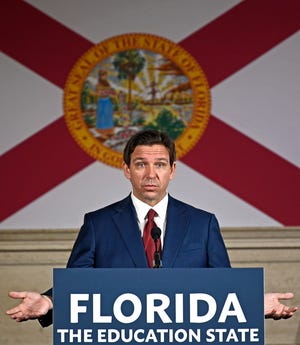During this summer, a team of students from MIT embarked on a journey to the sou …
National college professors group accuses New College of being a politically motivated takeover
Jennifer Livingstone

A state college in Florida that has been under scrutiny from state conservatives is now facing an uncommon penalty following what a group of notable professors described as an “unprecedented politically motivated takeover.”
The governing body of the American Association of University Professors has decided to impose a sanction on New College of Florida for “significant non-compliance” with academic governance standards, the organization revealed in a press release issued on Monday.
This decision marks a new chapter in the ongoing conflict surrounding the public liberal arts institution in Florida, which has garnered national attention amidst efforts by conservative forces to redefine its identity and purpose – primarily driven by the state’s governor, and former presidential candidate, Ron DeSantis.
A sanction from the AAUP is intended to alert professors and others to inadequate working conditions at higher education establishments, as indicated in the organization’s list of sanctioned institutions.
In a detailed 32-page report from December titled “Political Interference and Academic Freedom in Florida’s Public Higher Education System,” the AAUP accused state officials of enforcing a “strongly ideological agenda, characterized by a complete disregard for shared governance” on the campus, according to the organization.
“The impact is spreading beyond the state of Florida. This is not just a localized issue,” stated Amy Reid, the faculty representative on the Board of Trustees of New College, during an interview with the AAUP committee.
Nathan March, a spokesperson for New College, argued that the AAUP does not possess the authority to sanction individuals. He dismissed their declaration as a mere attempt to grab headlines. “Their continuous targeting of New College for any form of change they disagree with only affirms that New College is leading the charge in reshaping higher education,” he asserted. In response to the report released by the AAUP in December, New College President Richard Corcoran expressed a differing sentiment, stating that the findings did not align with his vision for the institution. “We are dedicated to fostering a progressive environment that promotes open inquiry, expression, and academic excellence,” Corcoran emphasized. “Our goal is to redefine the landscape of higher education, nurturing an era where profound scholarship and purposeful learning flourish.”
Following January 6, 2023, New College has been undergoing a transformation led by DeSantis. A member of the governor’s staff described this shift as an attempt to model the college after Hillsdale College, a private conservative, Christian liberal arts institution in Michigan.
DeSantis initiated the transformation by appointing six new conservative trustees to the college’s board, who promptly dismissed the incumbent president and installed former education commissioner and Florida Speaker of the House Richard Corcoran as the interim president.
Subsequently, Corcoran expedited the establishment of an athletics department at the college, which previously only participated in minor club sports managed by students. While sports bolstered enrollment to record levels through athletic recruitment, it came at the expense of academic performance in terms of test scores and GPA.
Following the decline in academic performance and the tarnishing of the school’s reputation, New College descended 24 spots in the U.S. News and World Report rankings of top liberal arts colleges nationwide.
Despite the substantial funding allocated by the state to support the transformation, a considerable number of students and faculty opted to leave the institution. Over one-third of the faculty departed in the months following the announced changes, a figure that Brad Theissen, New College’s provost, deemed “excessively high.”
Contributing: Zachary Schermele, USA TODAY
.

